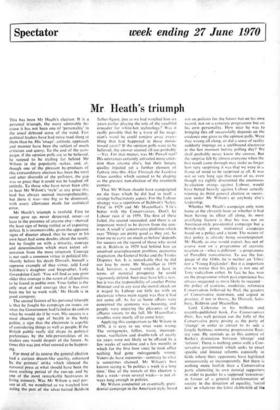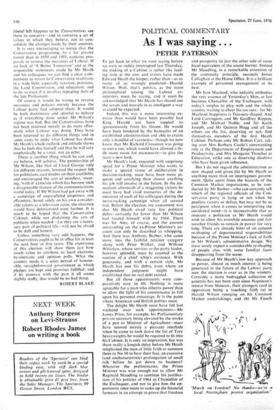Mr Heath's triumph
This has been Mr Heath's election. It is a personal triumph, the more admirable be- cause it has not been one of 'personality' in the usual debased sense of the word. Few political leaders have had more mud slung at
them than he. His 'image'. attitude, approach and manner have been the subject of much criticism and query. To the end of the cam- paign, if the opinion polls are to be believed, he seemed to be trailing far behind Mr Wilson in the popularity stakes, and, al- though one of the pleasant by-products of this extraordinary election has been the total and utter discredit of the pollsters, the gap was so great that it could not be laughed off entirely. To those who have never been able to bear Mr Wilson's 'style' at any price this lead has always seemed incomprehensible, but there it was—too big to be dismissed, with every allowance made for statistical error.
Mr Heath's triumph is twofold. First he never gave up, never despaired. never—at least in the presence of anyone else—showed the least sign of being rattled or of expecting defeat. It is inconceivable, given the apparent signs of disaster ahead, that he never in his own heart had some doubts about the result; but he fought on with a tenacity, courage and determination which must extort ad- miration from the most reluctant. Courage is not such a common virtue in political life. Shortly before his death Disraeli, himself a supreme example of that .virtue, told Lord Salisbury's daughter and biographer, Lady Gwendolen Cecil; 'You will find as you grow older that courage is the rarest of all qualities to be found in public men. Your father is the only man of real courage that it has ever been my lot to work with.' Mr Heath is in good company.
The second feature of his personal triumph is that he fought his campaign on issues, on what the Government had failed to do and on what he would do if he won. His success is a most cheering sign of health in the body politic, a sign that the electorate is capable of considering things as well as people. If the British public really did shape its political preferences by the tele-personalities of its leaders one would despair of the future. At times this was just what seemed to be happen- ing.
For most of its course the general election had a curious dream-like quality, enhanced by the printers' strike which silenced the national press at what should have been the most exciting period of the run-up, and by one of the most remarkable heatwaves in living memory. Was Mr Wilson a real per- son at all, we wondered as we watched him acting the part of the silver-haired Baldwin
father-figure. just as we had watched him six years earlier playing the role of the youthful crusader for white-hot technology? Was it really possible that by a wave of his magi- cian's wand he could conjure away every- thing that had happened in those storm- tossed years? If the opinion polls were to be believed, the answer seemed all too probably
—Yes. For that matter, was Mr Powell real? His utterances certainly attracted more atten- tion than anyone else's, but their lunatic quality injected yet a further element of fantasy into this Alice Through the Looking Glass combat which seemed to be shaping as the greatest non-election of the twentieth century.
That Mr Wilson should have campaigned on the lines which he did had in itself a strange hallucinatory aspect. For the Labour strategy was a repetition of Baldwin's 'Safety First' in 1929 and Mr Macmillan's 'Life's better with the Conservatives. Don't let Labour ruin it' in 1959. The first of these failed, the second succeeded, and there is an important moral to be drawn from the con- trast. A small 'c' conservative platform which says 'Things are pretty good as they are. So trust me to carry on much as before' depends for success on the record of those who stand on it. Baldwin in 1929 had behind him an unsolved unemployment problem, economic stagnation, the General Strike and the Trades Disputes Act. It is remarkable that he did not lose by more. Mr Macmillan in 1959 had, however, a record which at least in terms of material prosperity he could vigorously defend. Suez may have left a scar, but it was the responsibility of another Prime Minister and in any case the moral attack on it waged by Labour cut little ice with an electorate whose main regret was that it had not come off. As far as home affairs were concerned the economy was booming, and people were enjoying the pleasures of the affluent society to the full. Mr Macmillan's troubles were nearly all to come later.
Applying this comparison to Mr Wilson in 1970, it is easy to see what went wrong. The stringencies, follies, waste, incompe- tence, vacillation and double-talk of nearly six years were not likely to be effaced by a few weeks of sunshine and a few months in which for the first time since he took office nothing had gone outrageously wrong. Voters do have memories—contrary to what is sometimes claimed. Mr Wilson's best known saying is 'In politics a week is a long time.' One of the morals of this election is that a week—even several weeks—is not al- ways long enough in politics.
Mr Wilson conducted an essentially presi- dential campaign in the American style, based not on policies for the future but on his own record, not on a concrete programme but on his own personality. How near he was to bringing this off successfully depends on the credence one gives to the opinion polls. Were they wrong all along, or did a sense of reality suddenly impinge on a spellbound electorate at the last moment before polling day? We shall probably never know the answer. But the surprise felt byalmost everyone when the first result came through may make us forget how very surprising it was that we were in a frame of mind to be surprised at all. It was not so very long ago that most of us, even though we rightly discounted the enormous by-election swings against Labour, would have betted heavily against Labour actually winning its third general election in succes- sion under Mr Wilson's or anybody else's leadership.
Whether Mr Heath's campaign only went home at the eleventh hour or whether it had been having its effect all along, its most gratifying feature is that his was not an American-style presidential campaign but a British-style prime ministerial campaign based on a policy and a team. The nature of that policy is already being misinterpreted. Mr Heath, as one would expect, has not of course won on a programme of atavistic reaction or—what is different --a programme of Powellite romanticism. To use the lan- guage of the 1840s. he is neither an 'Ultra' nor a 'Young Englander'. But it is important also to notice that his policy is not one of Tory radicalism either. In fact he has won on the programme which past experience has always suggested as most likely to succeed— the policy of cautious, moderate, reformist Conservatism followed by Peel, the greatest of Conservative statesmen, and copied in practice, if not in theory, by Disraeli, Salis- bury, Baldwin and Macmillan.
Lord Coleraine in his brilliant and recently-published book, For Conservatives Only, has well pointed out the folly of the Conservative party posing as the party of 'change' in order to attract to its side a largely fictitious minority progressivist float- ing vote. He reminds us in this context of Burke's distinction between 'change' and 'reform'. There is nothing amiss with a Con- servative government which seeks to enact specific and limited reforms especially in fields where their opponents have legislated unnecessarily or incompetently. But there is nothing more foolish than a Conservative party alienating its own natural supporters in order to pander to a supposed 'consensus' in favour of a general transformation of society in the direction of equality, 'social mix' or whatever the latest shibboleth of the liberal left happens to be. Conservatives are there to conserve—and to conserve a set of values in which they believe, not to con- solidate the changes made by their enemies.
It is very encouraging to notice that the Conservative programme, to a far greater extent than in 1950 and 1951, contains pro- posals to reverse the measures of Labour. If we look at 'A Better Tomorrow' and at the responsible statements made by Mr Heath and his colleagues we can find a clear com- mitment to revert to Conservative traditions in a wide field, especially taxation, pensions, the Land Commission, and education; and to do so even if it involves repealing Acts of the late Parliament.
Of course it would be wrong to reverse measures and policies merely because the Labour party had adopted them. It would be both doctrinaire and spiteful to behave as if everything done under Mr Wilson's regime was bad. But the Conservatives have not been returned merely to do more effec- tively what Labour was doing. They have been returned to do different things and in some cases to undo what Labour has done. Mr Heath's whole outlook and attitude shows that he feels this himself and that he will very emphatically be a voice, not an echo.
There is another thing which he can and, we believe, will achieve. The premiership of Mr Wilson, like that of Lloyd George only for different reasons, lowered the respect felt for politicians, cast doubts on their credibility and encouraged the sort of mindless, sneer- ing, 'with-it' cynicism which has become such a disagreeable feature of the communications world today. If Mr Wilson had got away with a campaign of unparalleled emptiness and effrontery, based solely on his own consider- able talents as a television actor, the situation would have deteriorated even further. It is much to be hoped that the Conservative Cabinet, while not disdaining the arts of publicity when needed—for they are a neces- sary part of political life—will not be afraid to be dull and honest.
Unless something very odd happens, the Conservatives ought to be in office for at least the next four or five years. The experience of this election will show them just how much value to attribute to local elections, by-elections and opinion polls. What the country needs is a quiet period of honour- able, straightforward government in which pledges are kept and promises fulfilled; and if by contrast with the past it all seems slightly stuffy, that would be no bad thing.
ROBERT BLAKE































 Previous page
Previous page